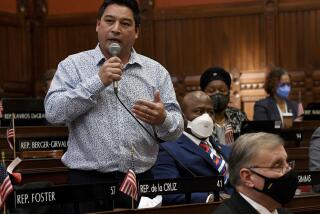Bush Signs Bill Raising Salaries for Lawmakers
- Share via
WASHINGTON — President Bush signed legislation Thursday giving members of the House a pay raise to nearly $125,000 by 1991 but giving a smaller boost, to about $100,000 a year, to senators.
The two-tier pay system was approved by Congress shortly before the end of the congressional session in November and was incorporated into a sweeping package of ethics reforms for lawmakers.
The differences in the pay scales resulted because the House voted for a 25% pay increase in 1991 that the Senate refused to take. Senators voted to limit their raise to a 9.7% cost-of-living increase, but under the new rules senators will be able to keep more outside income than House members.
Senators and congressmen currently receive $89,500.
House salaries will climb to $96,600 next February, to about $99,500 on Oct. 1 and to about $124,400 on Jan. 1, 1991. Senate salaries will increase to $98,500 in February, and to $101,400 next Oct. 1 and stay at that figure.
Honorariums for House members, such as speaking fees, will be banned at the end of 1990. For senators, the limit on such income will be cut from the present $35,800 to $23,586.
The pay for federal judges and high-ranking officials in the executive branch will climb at the same rate as House members’ salaries.
The President’s action was announced as he left the White House for his weekend summit in the Mediterranean with Soviet President Mikhail S. Gorbachev.
In a brief statement, Bush noted that the ethics portion of the new law is based on legislation he sent to Congress last April and includes “important adjustments to compensation for all three branches of the government.”
The ethics provisions put a ceiling on gifts that members of Congress can receive, except from relatives, and limits privately funded speaking tours to four days inside the United States and seven days for overseas travel.
The law also repeals, effective in 1993, a provision of House rules that allows members elected before 1980 to convert campaign funds to personal use when they retire. It also freezes immediately amounts that can be converted before 1993.
The new law also requires more detailed financial disclosure and bans lobbying by former members and top staffers on Capitol Hill for one year--a rule similar to that already in effect for top executive branch officials.
More to Read
Get the L.A. Times Politics newsletter
Deeply reported insights into legislation, politics and policy from Sacramento, Washington and beyond. In your inbox twice per week.
You may occasionally receive promotional content from the Los Angeles Times.










